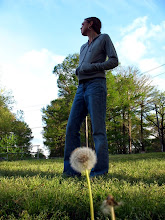 One of the most easiest ways to add organic material to your soil without bringing in outside inputs is by composting your yard clippings and kitchen waste. Composting isn't just good for your soil, according to Harmonious Technologies in the book Backyard Composting:
One of the most easiest ways to add organic material to your soil without bringing in outside inputs is by composting your yard clippings and kitchen waste. Composting isn't just good for your soil, according to Harmonious Technologies in the book Backyard Composting:Composting at home reduces your personal volume of trash, conserves water, increases plant growth, replaces the need for harsh chemical fertilizers and pesticides, and is also fun (p.5).Backyard composting can be an inexpensive way to contribute to the health of your own backyard while at the same time reducing your ecological footprint, and it can be done for alm
 ost nothing. To build my bin composter I went on craigslist.com and found some free pallets. I then wired the pallets together to create the bin that will house my compost pile while it turns from kitchen scraps and yard waste into humus rich soil.
ost nothing. To build my bin composter I went on craigslist.com and found some free pallets. I then wired the pallets together to create the bin that will house my compost pile while it turns from kitchen scraps and yard waste into humus rich soil.Backyard Composting provides several "recipes" for composting, all of which combine brown materials such as leaves and green materials like kitch
 en scraps. I am using recipe #2 in my composter:
en scraps. I am using recipe #2 in my composter:3 parts Dry Leaves
1 part Fresh Garden Weeds
1 part Fresh Grass Clippings
1 part Food Scraps (p. 35)

My backyard does not have a lot trees, so I had to enlist the help of neighbors to procure extra leaves and lawn trimmings. Kitchen scraps, my green material, are much easier to come by. My coffee grounds, banana peels and other organic waste can now be food for my garden rather than being sent to a landfill where the nutrients will be lost rather than added back into the land. Composting allows me to practice good land stewardship on a personal scale.
Starting my compost pile now keeps me working on my garden even though we are in the off season. If everything turns out right, the compost will make great fertilizer and potting soil in the spring.

No comments:
Post a Comment